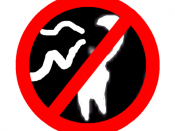Table Of Contents .
Chapter 1- Introduction and Clarification
Chapter 2- Everyday Usage of Profanity
Chapter 3- How Profanity Offends
Chapter 4- A Look at the Literal Meanings and Taboo
Chapter 5- Phatic and Emotive Language
Chapter 6- The Employment of Substitutes
Chapter 7- A Brief Historical Perspective
Chapter 8- The Use of Profanity in the Media
Chapter 9- Conclusions
Bibliography
The Function of Profanity in Modern English
Chapter 1- Introduction and Clarification
Since the beginning of the English language, there have existed certain words that were considered by the majority to be taboo, or not to be spoken in polite discourse. Over the centuries, these words have changed, some disappearing from the language altogether and some simply taking on new meanings or functions. One wonders why, if these words were considered too rude to be spoken, they were ever used, and consequently, how they remained a fixture in a language known for its passing trends and short-lived fashions.
Could it be that these words were, and are, essential for communication? Would the English language be as effective without these words? Are efforts to repress them futile? Does the popularization of such vocabulary create the need for new words with the same taboo status as the original words? To summarize: Does profanity serve a useful purpose in the English language?
In order to answer a question this complex, certain guidelines must be set. The word 'profanity' has a long list of taboo words associated with it, not all of which can be accommodated within such a short study. It is therefore necessary to limit which words we consider. Since this is a study of modern English, the words should be representative of the kind of profanity used today. In his superb study 'Swearing,' Geoffrey Hughes said:
...A major shift has...



Good Work! :)
This essay is great! Good Work. It's obvious you've put a lot of work into this essay as it's very detailed and well supported through examples and backup evidence. Keep the good work up!
2 out of 2 people found this comment useful.